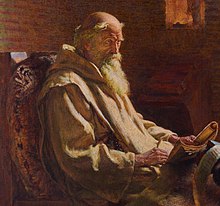Bēda


Bēda (Lǣden: Beda Venerabilis) (672 / 673 - 735) ƿæs lārēoƿ, munuc, and stǣrƿrītere þe āƿrāt þæt "Stǣr Angelþeodes cyricean" (Lǣden: Historia ecclesiastica gentis anglorum), and in þǣre bēc Bēda ymbe hine selfne cƿiþ:
Bēda Crīstes þēoƿ, and mæsseprēost þæs mynstres þāra ēadigra apostola Pētrus and Paulus þæt is æt Ƿīramūþon and on Gyrƿum. Ƿæs ic ācenned on sundorlande þæs ilcan mynstres. Mid þȳ ic ƿæs seofanƿintre, þā ƿæs ic mid gīmene mīnra māga seald tō fēdanne and tō lǣrenne þǣm ārƿyrþan abbude Benedicte, and Cēolferþe æfter þon. and siðþan ealle tīd mīnes līfes on þæs ilcan mynstres eardunge ic ƿæs dōnde; and ealle geornesse ic sealde tō leornienne and tō smēagenne hālige geƿritu. and betƿih gehild regollices þēodscipes and þā dæghƿāmlican gīmene tō singanne on circan, mē symble sƿēte and ƿynsum ƿæs þæt ic oþþe lǣrde oþþe ƿrite.
(sƿā in Bright's Old English Grammar and Reader, ed. Frederick G. Cassidy and Richard N. Ringler, 3rd ed. New York; Holt, Rinehart and Winston, 1971, p. 105)
